- Needed: Paid Research Assistant(s) for a Beatle Project - October 28, 2023
- From Faith Current: “The Sacred Ordinary: St. Peter’s Church Hall” - May 1, 2023
- A brief (?) hiatus - April 22, 2023
Reader Nicole wrote in yesterday:
“Sometimes I think I will scream the next time I hear or see Lennon VERSUS McCartney. However, this video has gained a little traction in the past day and it really interests me.
Lennon storms it, but it’s the way people answer and their reasons (sometimes given, sometimes not) which are the interesting bit, to be honest. Note the apologetic way some people answer McCartney, for example. Highly recommend it, not for stirring up contention between fans of either of them but because who answers, what their answer is, and why they answer the way they do is often fascinating. I’d LOVE to be able to graph and analyze these results a little more – the demographics, when they answered, male/female, musicians vs actors, etc.”
The video is 34 minutes and change, so get comfortable before clicking it. It’s addictive, you’ll be watching for a while.
Amanda Palmer says, “Lennon” — and I must admit I thought, “Of course.”
Bo Diddley was great: “Neither one of ’em…I don’t understand what they’re doing. Never have.”
And seeing Eva Green reminded me that I really want to have some in-depth conversations with her. Everybody’s got to have life goals, eh readers?
Who Am I?
When you ask an artist this question in a publicity setting, a little calculation starts to whir: “What do I want the audience to think? That I’m motivated by my heart, higher aspirations, etc (in which case I’ll say ‘Lennon’) or ambition and wanting to be liked (‘McCartney’)?” Lennon “storms it” — nice phrase, Nicole — because all of these people have already been successful in a popular medium. At this point, you have money, fame, power, acclaim; what you don’t have, perhaps, is cred as an artist. So ‘Lennon’ is the stance most will take. I’ve been asked these kinds of questions in this kind of setting, and until the person is culturally unassailable, you’re going to get filtered answers. It’s the difference between how the Beatles acted towards the press in November 1963, as opposed to November 1967.
An Admission
I used to be a John guy. I loved his mind, and connected with him as a funny person and a writer. (A rocker who namechecks James Thurber? That’s my guy!) I never fell into the trap of thinking he was a particularly pleasant man — I’d grown up around too many addicts to live that Beatlefantasy — but has there ever been any mega-celebrity who was better at The Private Moment of Common Decency?
When Lennon was killed, people appeared from everywhere with stories of what a nice, normal guy he’d been; the pharmacist around the corner still has his picture in the window. He was a charming, charming man, and rich and famous and a genius, too. And there was an element of self-flagellation in this angle of worship, too: it was (so the story went) Lennon’s very refusal to be a bigshot that got him killed. So like a lot of people, I appreciated McCartney, but loved John.
Over the years, however, things began to change. As the person receded and the icon was created, I got turned off. I remember seeing “Imagine” in the theaters and thinking, “I just don’t like this guy.” That’s perhaps why I cut The Lives of John Lennon so much more slack than many Beatlefans — Goldman’s ghoul wasn’t real, but a necessary countermyth to the simplified, sanitized, commodified Lennon that began to emerge in the late 80s. Goldman aside, St. Lennon is a poseur and a bore, filled with weird resentments and narcissism, a ‘man of peace’ with a super-short fuse. He’s a concept, a teen-dream, and most of all a brand. Really connecting with St. Lennon is akin to “Liking” Doctors Without Borders on Facebook.
John Lennon the man was always smart and funny as hell; unpredictable, challenging, eccentric, oddly sweet and sweetly odd, very British but in love with Postwar America. St. Lennon the icon was (and is) weirdly simple, a preachy capitalist, a citizen of the world as long as every country has gated mansions in it. You can see a lot of John Lennon in Elvis Costello; you can see a lot of St. Lennon in Bono.
John or Paul? Or St. John?
As mercurial John Lennon was replaced in our culture by the lifestyle choice St. Lennon, I started to realize that maybe a lot of what rock deems uncool about Paul McCartney are actually things for every artist to aspire to: keeping at it, meticulous craft, desire to reach beyond the hip crowd, persevering in the face of criticism, having a stable marriage, raising kids. And I started listening more closely to Paul’s solo stuff, and finding plenty of good work in there.
In the eternal John versus Paul debate, I will eternally say “both,” for reasons discussed ad nauseam. John Lennon the person probably still beats out Paul McCartney the person, out of some small deference to the 12-year-old I once was. But unless the celebs in this video are really dedicated Beatlefans, they’re answering a false question. “Which Beatle is your favorite, the cool one or the not cool one?” And that false dichotomy, which was started in 1968 by Lennon himself, for his own reasons, is bullshit. That Yoko continues to reinforce it is a pity, but anybody who believes that John Lennon was St. Lennon is either silly or trying to sell you something. What this video shows is that celebrity has never been more about the triumph of branding over craft… the triumph of St. Lennon, over both John and Paul.
But we’ll leave the last word to Elle Fanning, actor from Maleficent: “Both of them! You have to have both of them to make up the Beatles!”

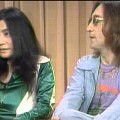
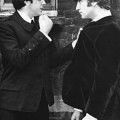
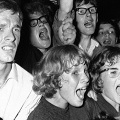

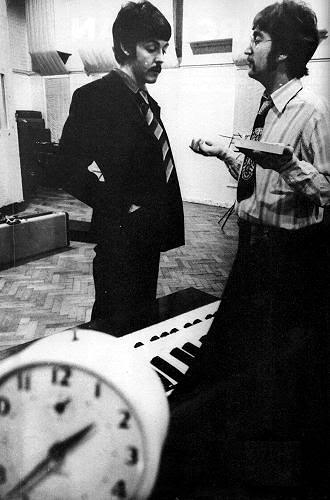




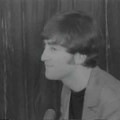
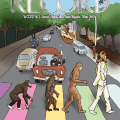

“Both” is the only fully reasonable answer, although it’s inevitable that everyone will have a Beatle whose work and personality he/she connects more easily and fully with. (I bet there are folks who would answer the “Lennon or McCartney?” question “Harrison.”)
I’m always going to be more partial to McCartney (duh, given what I’ve written on HD). That’s for a number of reasons, one being that I think his music contains more genuine fellow-feeling for people than Lennon’s. That’s increasingly important to me as the years pass.
Michael, I agree that asking celebrities “Lennon or McCartney?” is asking “Do you want to be an icon who is revered as a martyr, or a guy who’s spent decades making and playing music a lot of people enjoy?”
Sign me up for the minority report.
Nancy I agree that the only conceivable answer is ‘both’. Since I became a Beatles fan and first read the Davies book at the age of 10, I could never consider one without the other. To me they are almost one person split down the middle. Given that mindset whenever I see anything about Lennon or McCartney, or even more preposterous, Lennon vs.McCartney it’s like being asked which one of my hands I like better, or imagining my two hands at odds with each other. It’s almost unimaginable to me to think of them as separate at least while they were Beatles. I will admit that I see different strengths in each of them, and possibly different weaknesses, but those simply make them both more interesting.
My head goes for both. Of course.
But my heart goes for John – and that’s mainly for his singing. For that spine-tingling voice that Paul, for all his vocal brilliance, couldn’t quite match.
Everyone is entitled to their opinion, but Adam Duritz irritates me in this. He acts like melody wasn’t John’s thing, just as people underestimate Paul’s lyrics. Yes, Paul’s gift for melody is effortless but John wasn’t wanting for great melodies too. Indeed, he had more melody coming out of his little pinky that Duritz has in his entire skanky one-hit-wonder ass.
When people claim they used to be a John guy but are now fully in Paul’s corner it reminds me of the story of the Apostle Paul who used to persecute follower’s of Jesus before he had his epiphany on the road to Damascus: Their previous position is most assuredly invented to give his current position more credibility and impact.
And I would like some examples of how Paul’s songs are more relatable than John’s. I don’t want a list of John’s songs. I wants examples of Paul’s relatable songs including his solo work.
Just to start you off with a few of my favorite solo Paul songs with good lyrics from my favorite era of 70-99, I submit…..solo songs, just a few to get you started: some people never know little lamb dragon fly, love in song, must do something about it, don’t let it bring you down, somebody who cares, motor of love, wanderlust, peace in the neighborhood, calico skies, beautiful night, anyway, etc. I tried to pick from different albums. These are just a very few that I find extremely relatable and are personal favorites of mine but there are more. Many of his songs are genre ranging and blending and lyrics fit the song, like mull of Kintyre but lyrics are not necessarily the sole purpose of the song. He does not often use first person but does even in later Beatle and throughout some solo. I enjoy his impressionistic lyrics like pretty little head and some dismiss as stoner but as I see those lyrics as creatively different but similar to John’s surrealistic lyrics employed in later Beatles. I don’t want to overwhelm you. Many prefer his lyrics 2000 and later, but I like his 70-99 stuff and music myself as bought and grew up with it.
I didn’t shift my position from being a John fan from 64-mid seventies into being a Paul fan because I am a boomer to give Paul more credibility as in my day you were simply a Beatle fan but had a favorite. I simply had bought all Beatles and solo Beatles albums, kept up with them closely in the media and felt John’s early Beatle music was so strong but his solo was thin despite a few beautiful ballads, the style he himself had dissed as granny music. George songs were good but style was repetitive. I found Paul music and styles to be far more varied, expansive and creative and he was far better at absorbing the musical styles of the era.
It appears Paul’s stock has risen, so he doesn’t need more cred. He continues to be prolific and even does experimental music along. His first experimental album and associated singles McCartney II, long before the fireman works, blew me away as foresaw eighties synth, later techo and some artists after 2000, but I bought it then. It has been equated to Brian eno and has received upgraded reappraisal. I am a weirdo boomer as I like his 222, ballad of the skeletons and sway well as his Beatles stuff, I know you want relatable lyrics music, but I was astounded in the seventies at all if the various musical styles and genres he incorporated just in that decade and I am a boomer loving coming up well as remix of nothing for free. I felt the other Beatles stylistically stayed dated, though ringo has done pretty good stuff last few years.
*****
I failed to add a few songs with good, moving lyrics, summer’s day and winter rose/love awake just to add a few more songs with relatable lyrics.
One final thought, as a I was child in the sixties, I found I had to get older to find, early, later and solo Beatle music more relatable. As an adult, I can now relate much more to wings song daytime, nighttime suffering or wings 1882 song, John bless you song, George so sad song and Ringo’s walk with me song. I much better understood I’m a loser song, George guitar weeps and Paul’s oh! Darling anguish songs. I noticed throughout the years as I got older that I changed my relatable songs, though still enjoyed other songs and styles by Beatles and solo Beatles.
Thanks for sharing, Pidpoo. Electric Arguments is his best experimental album IMO. It’s excellent. I don’t care for any of the other Fireman albums as every track sounds exactly the same. As for McCartney II, I couldn’t stand it at first but it grew on me a little. Always did like One of These Days. I like melancholy songs and apparently you do as well, judging from your list. My favorite songs of Paul’s are his sad songs, not his storybook songs. Sad songs say so much.
I must confess that I am writing my comment without reading the others’s.
.
John or Paul? It’s a matter of taste, humor and maybe… age.
.
In my case, when I was an adolescent I used to be more inclined to John’s music (as a solo act) and to the Beatles songs mainly composed by him, especially those of the White Album. About Paul… emmmm… he used to be my guilty pleasure.
.
Now, as an adult, my preference for John (as an artist) has been reversed towards Paul, and I openly admit it, but why?
.
Thinking about it, I made some conclusions:
.
Adolescent> Adolescentem comes from “Adolescere” … “to grow” … I was growing up, suffering all kinds of sorrows that adolescence entails, including immaturity, depression, rebellion, idleness, a certain sharp attitude, etc. Maybe other teenagers were happier than me, I don’t know, but I certainly was sometimes in dark places of my mind and I swear that Lennon’s music fit my mood very well in those days, although there were also some prejudices that permeated my thoughts, “John was a genius”, “Paul was soft, lightweight”, “John was deep”, “Paul was saccharine sentimentality”,etc.
.
Then I grew up, those dark feelings left me and I became more mature and wise (I think). I noticed that John (his music) used to make me feel sad and somehow hurted me. It no longer satisfied me and no longer suited my mood. However, my relationship with McCartney (his music) improved, I stopped feeling ashamed that I liked it, because feeling that way didn’t make sense. His music really elevates my spirit, energizes me, and makes me sometimes happy, sometimes melancholic, but never make me feel uneasy or anxious.
.
I threw away all prejudices and embraced them both with their flaws and virtues …
.
I still like John, his music takes me to other galaxies, but I recognize that these types of trips are dangerous and very long, so I reserve him for special occasions.
.
I can’t help it, but I will always relate my younger, immature self to John and my older, mature self to Paul. You can draw your conclusions if you want.
.
I agree 100% with Paul Saxton above, BTW. John’s singing is what drew me to the Beatles in the first place. He just stood out in many ways, and his unique voice was one of them. Lately I’ve been listening to ‘Beatles 24/8’ on Sirius radio while exercising, and I find that his songs make the workout somehow less of a slog than Paul’s, George’s and Ringo’s. His voice just transports me. It doesn’t mean that his songs are better necessarily, but you can get lost in his voice. When you hear all their songs randomly one after the other, with their solo songs mixed in, you realize there isn’t a truly lousy one among them. It’s really all I need in this desert island called Covid-19.
.
Adults can suffer from depression and anxiety; it has nothing to do with immaturity LOL. Intelligence, maybe. People with OCD, for instance (an anxiety disorder), tend to be highly successful and intelligent. I remember seeing some French movie once where a guy said he wished he were stupid because then he wouldn’t be so depressed. Depression comes from thinking (brooding) too much. Anyway, I’m not always one way myself and a Beatles songs, no matter which one or who composed it, only helps my mood.
I actually prefer Paul rocking songs, as grew up in seventies and that is last true era of rock before disco, new wave then techno, rap and finally hip hop wiped it out or contemporary music evolved beyond rock. However, poster above wanted a list of relatable songs, so I stressed softer ones as lyrics usually better, more developed in those than in traditional seventies non concept or prog rock music. Wings sing call me back again and beware my love had relatable lyrics and very moving, harder rock performances, however. Wings over Europe concert really had rocking live concerts.
Thanks to poster above for liking my list. I too like electric arguments but, have my old boomer affinity for McCartney 2 and singles as I do back to egg and singles as McCartney 2 foreshadowed new wave and synth and egg album included punk then in England and CBGB NYC club and other styles of late seventies. As I majored in English in college, I never minded McCartney lyrics of stories but like some less than others.
I too feel I outgrew John solo music by mid seventies time John went MOR but liked his mid seventies albums and I outgrew his fractured later Beatle lyrics and outgrew George’s restricted eastern religious music themes as well . Most importantly, I feel that both John and George seemed to mature just before death as John last interviews his head seemed on straighter and John acknowledged Krishna was a cult and his last album entitled brainwashed.
Beware My Love is a GREAT song, by far the strongest track on that album, but how are those lyrics relatable? I can’t figure out who or what he is talking about.
Early sixties John voice was indeed a wonder to hear. He had a beautiful, distinct tenor singing and speaking voice. I remember thinking only possibly Michael Caine or maybe Richard Burton had speaking voices close to his. It was not just the songs, but John’s extraordinary singing voice that made the American version of A Hard Day’s Night my favorite early Beatle album and it remains so today. It was an album also when John was clearly Chief Beatle and when he was musically red hot. I noticed his thinning voice in later Beatles and was shocked in mid seventies at his voice on rock n roll music album and at Elton live performance. I was very glad that at end of his life, not only did he seem to regain some common sense as noted by his last interviews, he had regained his beautiful voice, one of his greatest assets as an artist. John’s voice lacked vocal range and varied style abilities but it was intrinsically beautiful on its on. To me, he and Elton with a similar sounding voice, had two of greatest voices in rock. The over production and late Beatles and solo album vocal flanging production styles to mask John’s vocals greatly hurt his later recordings which to me are badly in need of updated reissues with modern sound digital technology. John, because of his voice and prolific songs and his clear and comfortable role as Chief Beatle made him easily my favorite early Beatle as a kid in the sixties.
John did not lack vocal range. It’s funny how people think vocal range only means reaching the high notes. What about the low notes? Could Paul just as effortlessly reach the baritone notes of John in, say, I’m a Loser? This idea that Paul had more range than John is a myth. According to musicologists, they had the same length of range – Paul just happened to sit comfortably in a higher register and John in a lower register.
“John’s music made me feel sad and somehow hurted me.” LOL… the readers of this blog are so representative of Beatles fans.
Every person is entitled to his or her opinion. Please state your reasons for disagreement rather than dismissing someone else’s statement.
.
It should be clear by now that people have personal preferences, and that that when it comes to matters of taste, there is no “objective” position. Some tolerance and kindness go a long way.